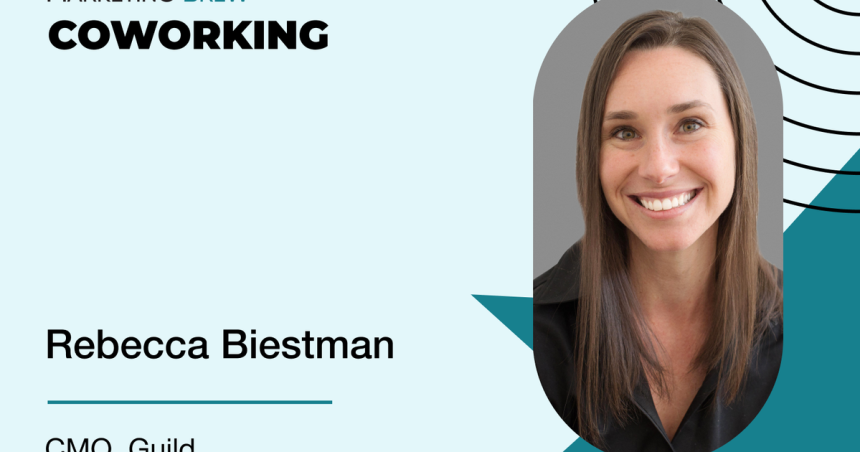Rebecca Biestman is CMO of Guild, an education benefit management company. Prior to joining Guild, she was CMO of Reputation.com and has served in marketing roles at software companies including Dialpad and RMS.
Favorite project you’ve worked on? A true career highlight has been launching Guild’s first-of-its-kind partnership with the USOPC and the LA28 Olympic and Paralympic Games. I had the opportunity to join the Team USA Media Summit in April with leaders from Team USA’s Athlete Services team, the USOPC, and USOPF, and I got to hear firsthand from these incredible athletes about what this will mean for their futures to have access to tuition-free education and career development opportunities. This partnership has reinforced the importance of keeping the outcomes that we produce for our learners—in this case Olympic and Paralympic athletes—at the center of our marketing. It has enabled us to take bold swings and to go beyond the traditional “logo slap” sports sponsorship. Our campaign around the partnership positions Guild’s lack of brand awareness as an asset rather than a liability, acknowledging this may be much of the general public’s first time hearing of us. And what better person to educate them than an elite athlete on their way to win gold?
What’s your favorite ad campaign? I think a lot about the “Intel Inside” campaign. They took a technical hardware decision that used to only sit with B2B buyers and a category that frankly only technical people were familiar with and successfully grew mass awareness to create a new consumer quality narrative. One little sticker became the reason you knew the computer you were buying at your local electronics store was quality. Even though their piece of the computer wasn’t visible to consumers, Intel made themselves a key component of the purchase cycle in a way that was just genius. I think marketers can really learn from this campaign. Don’t assume that you can’t take a complicated idea and gain mindshare from a large audience. We can and should take something that wouldn’t normally be seen or understood by the masses and help them to see why it matters to their lives.
Get marketing news you’ll actually want to read
Marketing Brew informs marketing pros of the latest on brand strategy, social media, and ad tech via our weekday newsletter, virtual events, marketing conferences, and digital guides.
One thing we can’t guess from your LinkedIn profile: At Guild events and beyond, I’m always the first one to warm up the dance floor. While I may identify as an extroverted introvert, I love a dance party and will dial up the extrovert part of my heart and get other people out there.
What marketing trend are you most optimistic about? Least? I feel like the trends I’m most and least optimistic about are really linked. I’m least optimistic about marketers sticking with the digital marketing playbook that made inroads five plus years ago. When it comes to digital marketing today, it’s almost impossible to stand out among the noise in a crowded/inundated landscape. The digital ABM motion that was so big for B2B marketing is now providing diminishing returns. B2B buyers, like all of us as consumers, have learned to tune out when being inundated online.
With that in mind, I’m most excited by the move towards a new kind of influencer—one that’s more of an evangelist sharing their authentic POV versus someone transparently selling me something because they have a brand deal.
What’s one marketing-related podcast/social account/series you’d recommend? A recent episode of Drew Neisser’s Renegade Marketers Unite showcased what CMOs can learn about influence from top hostage negotiators. Marketing Vanguard’s recent episode on-site at Cannes was a great reminder about why visuals aren’t optional for today’s marketers. And as someone who tasks my team daily to be customer-obsessed, I love the consumer trends highlighted by The Speed of Culture.
Read the full article here










